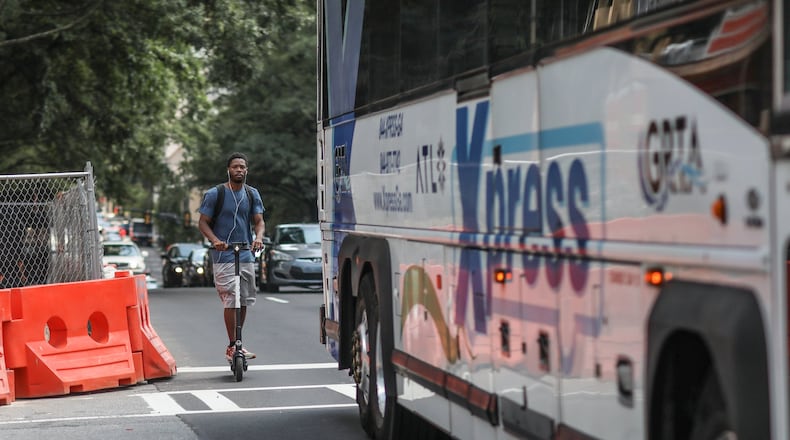Atlanta Mayor Keisha Lance Bottoms on Thursday announced that the city would stop issuing permits to companies seeking to deploy electric scooters on Atlanta’s streets after two people died in scooter-related accidents in recent months.
Bottoms’ said in a statement that her executive order prohibiting additional permits would help give the city time to navigate an issue that has confounded city leaders around the world: how to protect pedestrians while embracing a new form of mobility that might relieve traffic.
The order does not apply to existing permits.
Electric scooters have only been around for a little more than two years, but they have quickly grown into a multibillion-dollar industry and swept the world.
The two companies who began deploying them in 2017 — Bird and Lime — are now valued at $2.5 billion each.
The devices thrive in dense urban areas where they provide users a quick means to travel short distances. Their rise has helped fuel a new buzzword in the transportation industry: micromobility.
The reaction among government leaders has been mixed. Some places have banned electric scooters completely. Others have launched cautious pilot studies. And still others, like those in Atlanta, have sought to lightly regulate them.
But no city, it seems, has become the model for integrating them into its transportation network.
If anything, the devices’ popularity has forced cities to consider speeding up the addition of bike lanes to accommodate them.
The devices appeared on Atlanta’s sidewalks in the spring of 2018 when Bird suddenly deployed them. Urbanites buzzed around — and sometimes into — pedestrians on sidewalks while commuters sat trapped in traffic.
Lime followed suit a couple of months later.
Soon pedestrians complained about having to dodge scooters while walking on the sidewalk.
The City Council didn’t pass legislation regulating the devices until January. A new ordinance requiring scooter companies to obtain permits and submit data to the city went into effect Feb. 1.
Since then, the city has issued permits to nine companies to operate a total of 13,750 electric scooters.
The companies say they play an important role, especially in dense urban areas, by taking cars off the road and reducing pollution.
Preliminary data suggests they might be right.
City Planning Commissioner Tim Keane said in an interview Thursday that since Feb. 1, riders have taken 2.3 million trips on electric dockless devices, most of which are scooters. The average trip is about a mile. Based on recent studies, Keane estimated that roughly 700,000 of those trips would have otherwise been taken with cars.
“That is a hugely significant number,” Keane said.
Keane is a fan of the scooters and uses them.
He said the city has 120 miles of bike lanes, most of which were added since 2010. The city has plans for 46 additional miles. Keane said the city is considering ways to dramatically expand those plans.
Although the City Council’s scooter ordinance prohibited the devices from being ridden on sidewalks, the Atlanta Police Department didn’t begin ticketing riders until about a month ago. Even then, police mostly issued warnings. The department has issued a little more than dozen citations, spokesman Carlos Campos said.
Councilman Amir Farokhi’s District 2 is perhaps the city area most heavily populated by electric scooters. It includes Midtown, downtown, the Old Fourth Ward, Inman Park, Poncey-Highland and Candler Park.
Farokhi said the discussion about scooters is really a conversation about mobility within the city.
“It’s going to require us to rethink how we approach our streets and sidewalks,” Farokhi said.
And the uproar over electric scooters may force the city to go through that reassessment more quickly than expected.
The numbers suggest that the mayor’s executive order is unlikely to significantly reduce any future increase in the number of scooters in Atlanta.
Of the 13,750 scooters that have received city permits, only 5,494 have been deployed.
That means that the number of scooters on city streets could more than double at any time — regardless of the order.
About the Author
Keep Reading
The Latest
Featured




